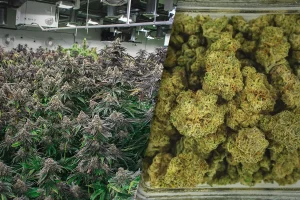
Mastering the Cannabis Harvest: Pro Tips for Cutting, Trimming, Curing, and Storing Your Crop
The harvest season is the most anticipated time for cannabis growers — when months of careful cultivation finally pay off. But cutting down the plants

As cannabis cultivation continues to expand in legal markets, growers are increasingly facing one of nature’s toughest challenges… extreme summer heat. Unlike indoor grow operations that rely on climate control, outdoor cannabis farms must work with the elements, making the health and yield of their plants highly dependent on weather patterns.
With rising global temperatures and increasingly erratic weather conditions, managing heat stress is becoming essential knowledge for every outdoor cannabis grower. So let’s dive into how extreme heat and humidity affect cannabis plants, the symptoms of heat stress to watch for, and practical solutions to protect and preserve your crop.
Heat stress occurs when cannabis plants are exposed to temperatures that exceed their optimal growing conditions, typically around 70–85°F (21–29°C) during the day. Once temperatures rise above 90°F (32°C), cannabis plants begin to struggle with maintaining their metabolic functions, especially if the heat is prolonged or coupled with high humidity.
While high humidity might seem like a natural buffer against heat, it presents its own set of issues… especially during flowering. High humidity paired with heat creates the perfect environment for mold and mildew, particularly bud rot (Botrytis) and powdery mildew, which can devastate a harvest if not caught early.
Installing shade cloth or temporary structures like pop-up canopies during peak daylight hours can help reduce direct sun exposure. 30-40% shade cloth is ideal for cannabis, reducing light intensity without impeding growth.
Irrigate early in the morning or late in the evening to minimize water loss due to evaporation. Consider drip irrigation to keep soil moist while conserving water and avoiding surface runoff.
Add a layer of organic mulch (e.g., straw, wood chips, or compost) around the base of plants. Mulch helps retain soil moisture, regulate root zone temperature, and suppress weed growth.
Ensure your soil has sufficient calcium and magnesium, which are essential during periods of heat stress. Supplements like silica also strengthen cell walls and improve resistance to both heat and pests.
Allow enough room between plants for airflow. Proper spacing reduces humidity buildup and prevents disease from spreading easily across your crop.
Some cannabis genetics are better adapted to hot climates. Look for sativa-dominant strains originating from equatorial regions. They naturally resist heat and humidity better than most indica varieties.
Encourage natural airflow by planting near a gentle breeze corridor or setting up reflective fencing. Avoid creating wind tunnels that could dry out the plants too quickly.
Add kelp extracts, humic acid, or fulvic acid to your nutrient regimen. These additives help with nutrient uptake and boost a plant’s stress tolerance.
Outdoor cannabis farming requires adaptability. Even with the best planning, a sudden heatwave can push plants to their limit. The key to navigating extreme summer conditions is vigilance. Monitor your plants daily, respond to early signs of stress, and implement a flexible strategy that evolves with the weather.
By applying these preventative and reactive techniques, you not only protect your plants but also increase the odds of a high-quality, resilient yield… even during the dog days of summer.

The harvest season is the most anticipated time for cannabis growers — when months of careful cultivation finally pay off. But cutting down the plants

Is THCA legal? Explore the fast-evolving U.S. debate over hemp-derived THCA, including industry divide, consumer safety, regulations, economics, and outlook. What is THCA, and why

As cannabis cultivation continues to expand in legal markets, growers are increasingly facing one of nature’s toughest challenges… extreme summer heat. Unlike indoor grow operations

As cannabis becomes increasingly mainstream in the United States, confusion still reigns over the difference between marijuana and hemp, two forms of the same Cannabis

Big changes are blooming at NuVue Pharma — and it’s all good news for your wallet. We’ve heard your feedback and looked closely at how

Despite over half of U.S. states legalizing cannabis for medical or recreational use, federal legalization remains elusive. While public opinion strongly favors reform and the

As the U.S. cannabis industry continues to thrive, driven by expanding state-level legalization and the growth of both medical and adult-use markets, new questions are

Day 1: Clue 1: This game is no trick, to find the Easter Egg you must be quick, get too close today, and I might

In a landmark shift for Colorado Springs, NuVue Pharma is set to commence recreational cannabis sales on April 15, 2025. This development follows a series

Colorado’s cannabis industry is poised for significant changes with the introduction of House Bill HB25-1209, titled “Marijuana Regulation Streamline.” This bill aims to enhance regulatory